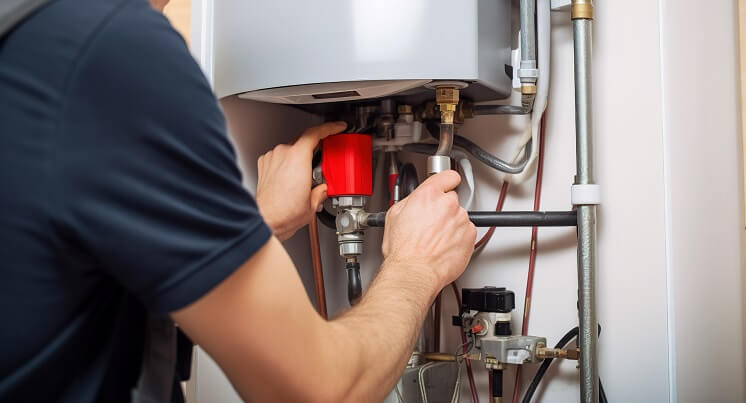This post listed below in relation to Water Heaters Problems is seriously compelling. Don't bypass it.

Imagine starting your day without your regular hot shower. That currently sets an inadequate tone for the rest of your day.
Every residence needs a dependable hot water heater, but just a couple of recognize how to manage one. One simple means to maintain your hot water heater in leading form is to look for mistakes regularly and fix them as quickly as they show up.
Bear in mind to switch off your hot water heater prior to smelling about for mistakes. These are the water heater faults you are most likely to encounter.
Water also hot or too cold
Every hot water heater has a thermostat that figures out exactly how hot the water obtains. If the water entering into your residence is as well warm despite setting a convenient optimum temperature, your thermostat may be damaged.
On the other hand, also cold water might result from a fallen short thermostat, a busted circuit, or incorrect gas flow. For instance, if you utilize a gas water heater with a broken pilot burner, you would certainly get cold water, even if the thermostat is in excellent problem. For electric heating systems, a blown fuse might be the wrongdoer.
Not nearly enough hot water
Water heaters can be found in numerous dimensions, depending upon your hot water needs. If you run out of warm water prior to every person has had a bathroom, your water heater is also small for your family size. You must consider setting up a bigger water heater storage tank or choosing a tankless hot water heater, which occupies less area and is more resilient.
Unusual noises
There are at least 5 sort of noises you can hear from a hot water heater, yet one of the most usual analysis is that it's time for the water heater to retire.
To start with, you should be familiar with the regular seems a water heater makes. An electric heating system may sound various from a gas-powered one.
Standing out or banging noises usually suggest there is a piece of sediment in your containers, as well as it's time to cleanse it out. On the other hand, whistling or hissing noises might just be your shutoffs letting some stress off.
Water leakages
Leakages could originate from pipes, water connections, valves, or in the worst-case circumstance, the tank itself. Gradually, water will wear away the storage tank, and locate its way out. If this takes place, you need to change your water heater asap.
Nonetheless, before your modification your entire container, be sure that all pipelines remain in place and that each shutoff functions perfectly. If you still need help determining a leakage, call your plumber.
Rust-colored water
Rust-colored water means one of your water heater elements is rusted. Maybe the anode pole, or the container itself. Your plumber will certainly be able to determine which it is.
Lukewarm water
No matter how high you set the thermostat, you won't obtain any type of warm water out of a heating system well past its prime. A hot water heater's efficiency may reduce with time.
You will certainly additionally get lukewarm water if your pipes have a cross link. This indicates that when you switch on a tap, warm water from the heating system moves in together with regular, cold water. A cross link is simple to spot. If your warm water faucets still pursue shutting the water heater shutoffs, you have a cross link.
Discoloured Water
Rust is a significant reason for unclean or discoloured water. Rust within the water container or a stopping working anode pole might create this discolouration. The anode rod secures the tank from rusting on the inside and also should be inspected annual. Without a rod or an effectively functioning anode pole, the warm water promptly wears away inside the tank. Get in touch with a specialist hot water heater specialist to figure out if changing the anode pole will certainly deal with the issue; if not, replace your water heater.
Final thought
Ideally, your water heater can last 10 years prior to you require an adjustment. Nonetheless, after the 10-year mark, you might experience any of these mistakes much more frequently. At this moment, you should include a brand-new water heater to your budget.
How To Troubleshoot 3 Common Water Heater Problems in Twin Cities
The Water Heater Is Leaking
A leaky cold water inlet valve A loose pipe fitting A leaky temperature and pressure relief valve A corroded anode rod A cracked tank Turn Off Your Water Heater:
Shut off your gas water heater by turning the gas valve on the unit to the “OFF” position. Shut off your electric water by switching its power off at your electrical panel. Look for a two-pole breaker labeled “water heater” and turn it to the “OFF” position. Move the ball valve connected to the water heater to be perpendicular to the piping at a 90° angle. Look for the Leak:
Depending on whether the water is coming from the tank's top or bottom, you’ll want to look for the leak in different locations.
If the leak comes from the top of the tank, carefully look for water escaping from the cold water inlet valve or loose pipe fittings. Rusted hot and cold water valves can have loose connections with the tank, with water leaking out of them.
https://mspplumbingheatingair.com/blog/how-to-troubleshoot-3-common-water-heater-problems
I ran across that blog post on Common Problems with Tank Water Heaters when doing a lookup on the web. Sharing is nice. Helping others is fun. We take joy in reading our article about Common Problems with Your Home Water Heater.
Expert care? Call.